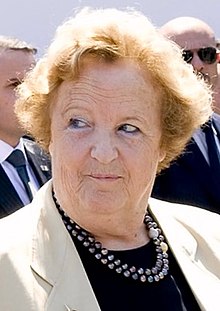Annamaria Cancellieri
Annamaria Cancellieri | |
|---|---|
 | |
| Minister of Justice | |
| In office 28 April 2013 – 22 February 2014 | |
| Prime Minister | Enrico Letta |
| Preceded by | Paola Severino |
| Succeeded by | Andrea Orlando |
| Minister of the Interior | |
| In office 16 November 2011 – 28 April 2013 | |
| Prime Minister | Mario Monti |
| Preceded by | Roberto Maroni |
| Succeeded by | Angelino Alfano |
| Commissioner of Bologna | |
| In office 17 February 2010 – 16 May 2011 | |
| Preceded by | Flavio Delbono |
| Succeeded by | Virginio Merola |
| Personal details | |
| Born | 22 October 1943 Rome, Italy |
| Political party | Independent |
| Alma mater | Sapienza University of Rome |
Annamaria Cancellieri (born 22 October 1943) is an Italian official and prefect who served as Minister of Interior in the Monti Cabinet and Minister of Justice in the Letta Cabinet.
Early life and education
[edit]Cancellieri was born in Rome on 22 October 1943.[1] She studied political science at the University of Rome.[2][3]
Career
[edit]Cancellieri worked for the ministry of interior beginning in 1972.[1] She then worked as a Prefetto (prefect) in Bologna, Vicenza, Bergamo, Brescia, Catania and Genova.[1] She retired from the provincial-level government representation.[4] She was subsequently appointed special commissioner of the municipalities of Bologna (in February 2010) and of Parma (in October 2011), temporarily taking over from the mayors in the wake of political scandals.[5]
She was appointed minister of interior on 16 November 2011, and was one of the technocrats in the Monti cabinet.
Her term in the Monti cabinet ended on 27 April 2013 when Enrico Letta announced that she would serve as justice minister in his cabinet.[6][7] The following day her tenure as justice minister began and she replaced Paola Severino in the post.[8] Andrea Orlando replaced her in the post in February 2014 when the Renzi cabinet was formed.[9]
Italian court reform
[edit]In 2013, Cancellieri and Letta's government went ahead with Severino's (and Monti government's) reform of Italian courts[10] initially planned in 2012. This overdue reform was deemed necessary by a number of people in order to streamline the functioning of some of the State's courts and was part of an effort by the Italian authorities to reduce the spending of public money. However, some harsh debate arose as cases occurred in which Cancellieri ordered to close efficient courts (e.g. the court of Bassano del Grappa,[11] one of the quickest[12] in Italy) merging them with slower, less efficient courts. The decree was also passed in contrast to the requests of various authorities of Bassano[13] and Veneto,[14] and even in contrast to the Italian Parliament's official stand. The closing of the court of Bassano was later confirmed by the Constitutional Court of Italy with the reason that "the courts of Bassano and Belluno could not be balanced within the same province..." despite the fact that Bassano and Belluno are not in the same province and the Court's judgement was thus based on a false premise.[15]
References
[edit]- ^ a b c "Il ministro Annamaria Cancellieri". Ministero dell'Interno. Archived from the original on 1 January 2012. Retrieved 28 December 2011.
- ^ "Tutti i ministri del governo Monti". ilpost. Retrieved 29 May 2012.
- ^ Francesca Giuliani (16 November 2011). "The Who's Who of the Monti Government". i-Italy. Retrieved 7 September 2013.
- ^ Hooper, John (16 November 2011). "Mario Monti's technocrats: profiles of the new Italian cabinet". The Guardian. Rome. Retrieved 9 September 2012.
- ^ "Dopo l'esperienza a palazzo d'Accursio Cancellieri commissario a Parma". La Repubblica, Bologna (in Italian). 20 October 2011. Retrieved 17 November 2013.
- ^ "Italy PM-designate Enrico Letta agrees new government". BBC. 27 April 2013. Retrieved 27 April 2013.
- ^ "Governo, Letta ha sciolto la riserva. 21 ministri: Alfano all'Interno e vicepremier. Saccomanni all'economia, Cancellieri giustizia Bonino agli Esteri, Mauro alla Difesa". La Repubblica. Rome. 27 April 2013. Retrieved 27 April 2013.
- ^ "Italian cabinet comes together". Euronews. 28 April 2013. Retrieved 7 September 2013.
- ^ Naomi O'Leary (21 February 2014). "Factbox: Who's who of the cabinet named by Italy's Matteo Renzi". Reuters. Retrieved 14 July 2014.
- ^ "Italian Court closures". The Economist. 18 August 2012. Retrieved 11 September 2013.
- ^ "Major of Bassano about the closure". La domenica di Vicenza. 2 February 2013. Retrieved 11 September 2013.
- ^ "Data about the court's functioning" (PDF). Bassano lawyers' blog about the issue. July 2012. Retrieved 11 September 2013.
- ^ "Mayor's address against the court closure". Official site of the Municipality of Bassano del Grappa. 2012. Retrieved 11 September 2013.
- ^ "President of Veneto against slow "agony" of the court". Il Giornale di Vicenza. 5 September 2013. Retrieved 11 September 2013.
- ^ "Corte costituzionale Ordinanza 29 gennaio 2014" (PDF). Il Sole 24 Ore. 1 February 2014. Retrieved 3 February 2014.
External links
[edit] Media related to Annamaria Cancellieri at Wikimedia Commons
Media related to Annamaria Cancellieri at Wikimedia Commons
- 1943 births
- Candidates for President of Italy
- Ministers of the interior of Italy
- Letta Cabinet
- Living people
- Politicians from Rome
- Sapienza University of Rome alumni
- Ministers of justice of Italy
- Women government ministers of Italy
- 21st-century Italian women politicians
- Female interior ministers
- Female justice ministers


